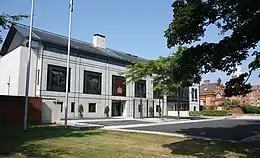Embassy of the United Kingdom, Dublin
The Embassy of the United Kingdom in Dublin is the chief diplomatic mission of the United Kingdom of Great Britain and Northern Ireland in Ireland. The Embassy is located on Merrion Road in the Ballsbridge area of the city. The current British Ambassador to Ireland is Paul Johnston.[1]
Embassy of the United Kingdom, Dublin
 | |
|---|---|
| Location | Ballsbridge, Dublin |
| Address | 29 Merrion Road, Ballsbridge, Dublin 4, D04 P272, Ireland |
| Coordinates | 53.3251°N 6.2238°W |
| Ambassador | Paul Johnston |
| Website | British Embassy, Dublin |
History
Although the Irish Free State was established in 1922, the United Kingdom did not have a diplomatic mission of its own. The only British representation in the State was that of the Trade Commissioner, first appointed in 1929.[2]

By contrast, the Irish High Commission (now the Embassy of Ireland) in London was established as early as 1923.[3]
It was not until 1939 that a separate mission, known as the British Representative's Office, was finally established.[4] Following the passing of the Republic of Ireland Act by the Oireachtas in 1948, under which Ireland withdrew from the Commonwealth the following year, the mission was renamed the British Embassy, with its head restyled Ambassador.
Until 1972, the embassy was located at 39 Merrion Square, on the southside of Dublin city center.[5] On 2 February of that year, it was burnt to the ground with petrol bombs during demonstrations by large crowds of people.[6] This occurred following the Bloody Sunday massacre in Derry on 30 January, where the British Army's Parachute Regiment shot and killed fourteen unarmed Catholic civilians during a civil rights demonstration.[7]
In 1981, protesters tried to storm the British Embassy in response to the IRA hunger strikes of that year.[8][9]
The current embassy building on Merrion Road was built in 1995 and designed by Allies and Morrison. It is built around a central courtyard, a cloister-like space.[10]
Following the death of Her Majesty Queen Elizabeth on 8 September 2022, the President of Ireland Michael D. Higgins, accompanied by Taoiseach Micheál Martin and Foreign Affairs Minister Simon Coveney, attended the British Embassy in Dublin to sign their condolences.[11]
Ambassador's residence

The British Ambassador's official residence in Dublin is Glencairn House, located on Murphystown Road. Glencairn House has been the official residence of successive British Ambassadors to Ireland since the 1950's.[12]
See also
References
- Johnston, Paul. "Mr Paul Johnston - GOV.UK". www.gov.uk. Retrieved 8 November 2018.
- The Chemical Trade Journal and Chemical Engineer: A Weekly Newspaper Devoted to the Commercial Aspect of the Chemical and Allied Industries, Volume 84, Kelville Davis Davis Bros. (C.T.J.) Limited, 1929, page 520
- Documents on Irish Foreign Policy: 1939-1941, Department of Foreign Affairs, Royal Irish Academy, 2008, page xix
- Defending Ireland: The Irish State and its Enemies since 1922, Eunan O'Halpin, OUP Oxford, 1999, page 151
- Whitaker's Almanack, J. Whitaker & Sons, 1972, page 795
- Hoggart, Simon (3 February 2015). "From the archive, 3 February 1972: British Embassy petrol bombed in Dublin". The Guardian. ISSN 0261-3077. Retrieved 23 February 2023.
- "1972: British embassy in Dublin destroyed". BBC On This Day. 2 February 1972. Retrieved 15 March 2015.
- "1981: Violence erupts at Irish hunger strike protest". BBC On This Day. 18 July 1981. Retrieved 27 July 2017.
- "The Hunger Strike of 1981 – A Chronology of Main Events". CAIN. Archived from the original on 31 May 2007. Retrieved 26 May 2007.
- "1995 – United Kingdom Embassy, Merrion Road, Dublin". archiseek.com/. 20 January 2010. Retrieved 15 March 2015.
- "Charles formally declared British King as Elizabeth's funeral details released". TheJournal.ie. Press Association. 10 September 2022. Retrieved 23 February 2023.
- "Residence Manager British Ambassador's Residence Dublin (IRL21.326) - FCO Local Posts". fco.tal.net. Retrieved 23 February 2023.